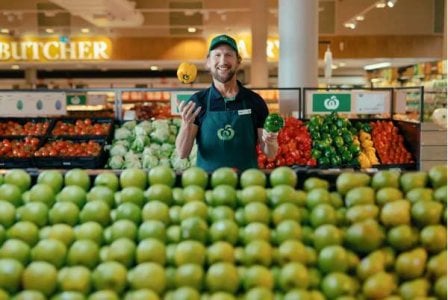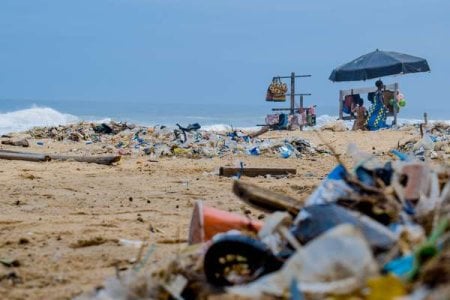Is Woolworths really fighting waste? You won't believe their latest move involving a PLASTIC sticker!
At the Seniors Discount Club, we like to do our part to promote eco-friendly initiatives and waste reduction campaigns. But when it comes to the issue of plastic waste, it appears one of the leading supermarket chains may not be entirely as committed as they’d like us to believe.
Recently, Woolworths announced a 'revolutionary concept' to encourage customers to buy ripe avocados and thereby reduce food waste.

The plan involves putting tiny stickers on the ripe fruit with the message 'Eat Now'.
The supermarket argues that the stickers will not only result in fewer fruits going bad and being thrown away but will also reduce the prevalence of ‘avocado squishing’, which can often ruin the fruit in store. Read more about this concept here.
However, there's a rather important detail that Woolies left out during its initial announcement—these tiny stickers are made of plastic and, even worse, are not recyclable!
It begs the question: in their efforts to wage war on food waste, has Woolworths disregarded the environmental impact of their plastic sticker solution?
New Zealand has taken a much more proactive approach to the issue of plastic waste.
Starting from July 1, the country will ban non-compostable stickers on domestically produced fruit, a rule that will extend to imported fruits by 2025.
Other supermarket staples like plastic produce bags, plates, straws, and cutlery will also be given the boot, with a ban on all other polystyrene food and drink packaging due by 2025.

The impact of plastic waste on the environment and marine life is well-documented, with plastic debris polluting our oceans, entangling and killing marine animals, and even making its way back into our food chain as microplastics. This makes the use of non-recyclable plastic stickers even more concerning.
Jeff Angel, the founder of the anti-plastic, non-profit Total Environment Centre, expressed his concern regarding Woolworths' plastic sticker approach.
He believes that plastic fruit and vegetable stickers are on their way out as many Australian states plan to phase out single-use plastic items.
'I think Woolies should show more foresight. Plastic fruit and veg stickers are often appearing on proposals to ban single-use plastic items.' Angel stated.
He did praise some efforts made by retailers to cut down plastic use, but he has advice for Woolworths: 'It seems like its food waste people aren't talking to its plastic waste people, and they should get together and do something more sustainable.'

Several eco-friendly alternatives to plastic stickers do exist. Supermarkets could use compostable or biodegradable stickers or implement non-toxic ink stamps or laser etching techniques to ‘print’ things directly onto the fruit.
These options minimise environmental impact while still serving the purpose of identifying ripe fruits for customers and thereby hopefully reducing wastage.
Members, feel free to share your thoughts on this issue—Is it worth paying for using plastic stickers to reduce food waste, or should Woolworths find a more eco-friendly solution? Let us know what you think!
Recently, Woolworths announced a 'revolutionary concept' to encourage customers to buy ripe avocados and thereby reduce food waste.

Woolworths has faced criticism for introducing a new line of plastic stickers as an attempt to mitigate food waste. Source: Woolworths Group
The plan involves putting tiny stickers on the ripe fruit with the message 'Eat Now'.
The supermarket argues that the stickers will not only result in fewer fruits going bad and being thrown away but will also reduce the prevalence of ‘avocado squishing’, which can often ruin the fruit in store. Read more about this concept here.
However, there's a rather important detail that Woolies left out during its initial announcement—these tiny stickers are made of plastic and, even worse, are not recyclable!
It begs the question: in their efforts to wage war on food waste, has Woolworths disregarded the environmental impact of their plastic sticker solution?
New Zealand has taken a much more proactive approach to the issue of plastic waste.
Starting from July 1, the country will ban non-compostable stickers on domestically produced fruit, a rule that will extend to imported fruits by 2025.
Other supermarket staples like plastic produce bags, plates, straws, and cutlery will also be given the boot, with a ban on all other polystyrene food and drink packaging due by 2025.

The impact of plastic waste on the environment and marine life cannot be understated. The presence of plastic in our ecosystems poses grave threats to wildlife, habitats, and the delicate balance of our planet's ecosystems. Image by Lucien Wanda from Pexels
The impact of plastic waste on the environment and marine life is well-documented, with plastic debris polluting our oceans, entangling and killing marine animals, and even making its way back into our food chain as microplastics. This makes the use of non-recyclable plastic stickers even more concerning.
Jeff Angel, the founder of the anti-plastic, non-profit Total Environment Centre, expressed his concern regarding Woolworths' plastic sticker approach.
He believes that plastic fruit and vegetable stickers are on their way out as many Australian states plan to phase out single-use plastic items.
'I think Woolies should show more foresight. Plastic fruit and veg stickers are often appearing on proposals to ban single-use plastic items.' Angel stated.
He did praise some efforts made by retailers to cut down plastic use, but he has advice for Woolworths: 'It seems like its food waste people aren't talking to its plastic waste people, and they should get together and do something more sustainable.'
Key Takeaways
- Woolworths has launched a new plan to reduce food waste by placing plastic 'Eat Now' stickers on ripe avocados, which has been criticised by environmentalists.
- The stickers are made of plastic and are not recyclable, which has led to concerns about their impact on the environment.
- Australia's plastic laws lag behind countries like New Zealand, which will ban non-compostable fruit stickers by 2025.
- Jeff Angel, founder of the Total Environment Centre, suggests that Woolworths should focus on more sustainable solutions for reducing food waste and single-use plastic items.
Several eco-friendly alternatives to plastic stickers do exist. Supermarkets could use compostable or biodegradable stickers or implement non-toxic ink stamps or laser etching techniques to ‘print’ things directly onto the fruit.
These options minimise environmental impact while still serving the purpose of identifying ripe fruits for customers and thereby hopefully reducing wastage.
Members, feel free to share your thoughts on this issue—Is it worth paying for using plastic stickers to reduce food waste, or should Woolworths find a more eco-friendly solution? Let us know what you think!







